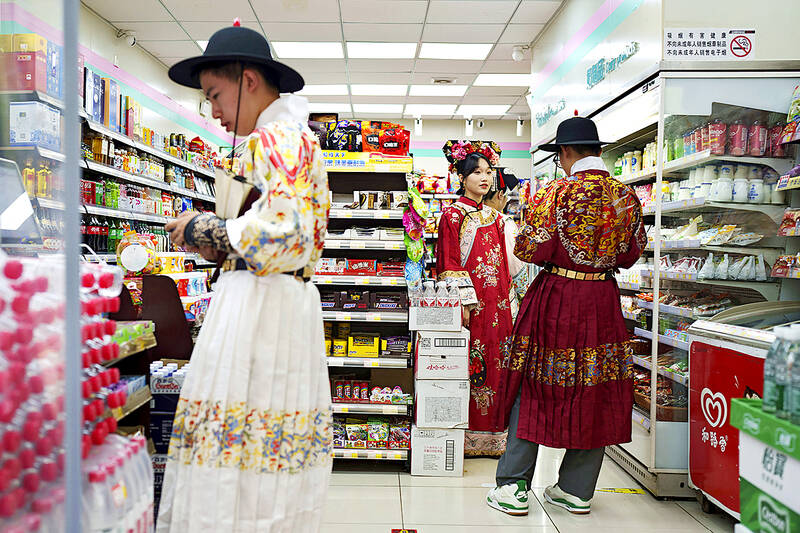On the Chinese Internet, the country’s current predicament — slowing economic growth, a falling birthrate, a meager social safety net, increasing isolation on the world stage — is often expressed through buzzwords. There is tangping, or “lying flat,” a term used to describe the young generation of Chinese who are choosing to chill out rather than hustle in China’s high-pressure economy. There is runxue, or “run philosophy,” which refers to the determination of large numbers of people to emigrate. Recently, “revenge against society” attacks — random incidents of violence that have claimed dozens of lives — have sparked particular concern. And there is also neijuan (內卷), or “involution,” a term used to describe the feeling of diminishing returns in China’s social contract.
WHAT IS NEIJUAN?
Neijuan is the Chinese term for “involution,” a concept from sociology that refers to a society that can no longer evolve, no matter how hard it tries. Applied to the individual, it means that no matter how hard someone works, progress is impossible.

Photo: AP
In China, the term has been used to describe the feeling of diminishing returns in China’s economy. The characters nei and juan literally mean rolling inwards. After decades of rapid growth, many Chinese millennials and Gen Z people feel that the opportunities that were available to their parents no longer exist, and that working hard no longer offers guaranteed rewards.
WHY ARE CHINESE LEADERS WORRIED?
China’s leaders have made it clear that they don’t want the idea of neijuan to catch on more than it already has. Top economic policymakers gathered this month for the annual Central Economic Work Conference, which sets the national economic agenda. According to the readout of the closed-door meeting, the cadres pledged to “rectify ‘involutionary’ competition.” And speaking at Davos in June, China’s premier, Li Qiang (李強), warned against “spiraling ‘involution’” in the world economy.
WHO IS AFFECTED?
It’s primarily a concept among millennials and generation Z. The latter group has been hit hard by China’s economic difficulties. Youth unemployment hit a record 21.3 percent in June last year, after which the government stopped publishing the data. It has since resumed publishing the statistics with a revised methodology. The latest data shows that the jobless rate for urban 16-24-year-olds is 17.1 percent.
Neijuan is also increasingly used to describe certain industries. China is investing massively in what it calls “new quality productive forces,” which means focusing more on research and manufacturing in certain hi-tech sectors, such as solar, electric vehicles and batteries. But overproduction, coupled with sanctions from the US and other western markets, has led to a price war in some sectors, hurting their profitability.
WHAT ARE ITS ORIGINS?
Although the term has been around for decades in academic circles, it went viral on China’s Internet in 2020. A student from Tsinghua University, one of China’s most elite schools, was filmed riding his bicycle with his laptop open, propped up on the handlebars. Soon he was crowned as “Tsinghua’s involuted king,” and a meme was born.
The meme of the involuted king came to represent the perhaps pointlessly intense pressure of China’s rat race, and the impossibility of catching a break. During the COVID-19 pandemic, many people felt physically as well as economically trapped.
The term was particularly popular in China’s hyper-competitive tech industry. Despite a workforce that is more educated than any previous generation, many graduates have found it difficult to find jobs in profitable sectors. This became even more of a problem when the Chinese government announced its “double reduction” policy in 2021. Designed to ease the pressure on school students, the policy banned for-profit online and offline tutoring, torpedoing a sector that had previously been a major employer of young graduates. One study suggested that 10 million people lost their jobs as a result of the policy.

Following the rollercoaster ride of 2025, next year is already shaping up to be dramatic. The ongoing constitutional crises and the nine-in-one local elections are already dominating the landscape. The constitutional crises are the ones to lose sleep over. Though much business is still being conducted, crucial items such as next year’s budget, civil servant pensions and the proposed eight-year NT$1.25 trillion (approx US$40 billion) special defense budget are still being contested. There are, however, two glimmers of hope. One is that the legally contested move by five of the eight grand justices on the Constitutional Court’s ad hoc move

Stepping off the busy through-road at Yongan Market Station, lights flashing, horns honking, I turn down a small side street and into the warm embrace of my favorite hole-in-the-wall gem, the Hoi An Banh Mi shop (越南會安麵包), red flags and yellow lanterns waving outside. “Little sister, we were wondering where you’ve been, we haven’t seen you in ages!” the owners call out with a smile. It’s been seven days. The restaurant is run by Huang Jin-chuan (黃錦泉), who is married to a local, and her little sister Eva, who helps out on weekends, having also moved to New Taipei

The Directorate-General of Budget, Accounting and Statistics (DGBAS) told legislators last week that because the Chinese Nationalist Party (KMT) and Taiwan People’s Party (TPP) are continuing to block next year’s budget from passing, the nation could lose 1.5 percent of its GDP growth next year. According to the DGBAS report, officials presented to the legislature, the 2026 budget proposal includes NT$299.2 billion in funding for new projects and funding increases for various government functions. This funding only becomes available when the legislature approves it. The DGBAS estimates that every NT$10 billion in government money not spent shaves 0.05 percent off

Dec. 29 to Jan. 4 Like the Taoist Baode Temple (保德宮) featured in last week’s column, there’s little at first glance to suggest that Taipei’s Independence Presbyterian Church in Xinbeitou (自立長老會新北投教會) has Indigenous roots. One hint is a small sign on the facade reading “Ketagalan Presbyterian Mission Association” — Ketagalan being an collective term for the Pingpu (plains Indigenous) groups who once inhabited much of northern Taiwan. Inside, a display on the back wall introduces the congregation’s founder Pan Shui-tu (潘水土), a member of the Pingpu settlement of Kipatauw, and provides information about the Ketagalan and their early involvement with Christianity. Most